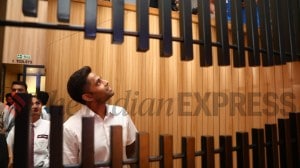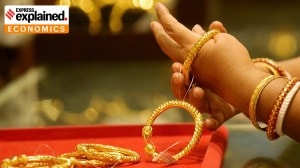Now petrol smells of death
I suffered from an acute childhood obsession, almost a fetish — love for the smell of petrol. It made be delirious, it had a macho arom...

I suffered from an acute childhood obsession, almost a fetish — love for the smell of petrol. It made be delirious, it had a macho aroma and I invariably sniffed out the closest fuel dispensing outlet. Small wonder then that my first career job was at a leading petroleum behemoth.
Twenty-one years later, as a young IIM graduate and IOC executive lies brutally slaughtered by Uttar Pradesh’s oil mafia, memories of that smell are no longer comforting. Will there be another Manjunath Shanmughan tomorrow, I wonder, slain with methodical precision because he discovered the nefarious nocturnal activities of the oil mob? The answer is loud and unequivocal. Yes.
I was told I had topped the written examination and interview in a strangely hushed manner by a secretary at the head office. It was an honour, I was made to understand, as this was amongst the early recruitments at this public sector enterprise post-nationalisation. This meant that amongst the 50-odd management trainees, I would be among a select few allowed to choose a functional discipline — operations, aviation or sales. Sales, it was. When I asked how could I have a sales target when we were advertising oil conservation, all I received were looks of contemptuous indifference. So off I went for my first professional posting to a regional office.
In those early days after nationalisation, the senior management staff were remarkably snooty. They were, most of them, card-holding members of the old boys club, alumni of St Stephens, Mayo and Doon. My first serious assignment entailed being attached to a local area sales officer (who would reminisce about the good old days of the company’s multinational past) and travelling in rural Maharashtra in his personal car. I noticed something fishy every time we visited a retail outlet. The quarterly inspection we were supposed to conduct was to have a sudden surprise element; instead it had become standard practice to inform the dealer concerned before-hand.
For a young man of 21 just six months into his first job, this defied common sense. It certainly was an eye-opener. As I soon discovered, the sales officer was second only to God Almighty himself, with the dealer genuflecting upon seeing us. Not surprisingly, the petrol pump would have immaculate house-keeping, the price charts would be correctly displayed, the customer complaint book filled with embarrassingly exaggerated adulation.
While the so-called inspection would be carried out amidst glasses of chai and samosas, elaborate dinner plans would be made. The dispensing pump staff would give the SO’s car a royal shampoo bath. But what really stunned me was the alacrity with which they would tank up the car. I never saw the SO pay, but he never failed to collect the petrol receipt. After all, one had to submit original vouchers for expense claims. My training thus left me thoroughly nonplussed. I longed to make an inspection tour all by myself. A month later, I got my chance.
I was sent to a popular district which housed some established dealers on the national highways and within the city. As I got off the red and yellow MSRTC bus, I was flabbergasted to see two prominent dealers awaiting my arrival, hands folded. Clearly, they had already been informed of my itinerary. I firmly refused breakfast and chai-pani, and got down to the dirty business of taking oil dip measurements.
Oil companies have a straightforward formula to calculate adulteration possibilities and evaporation losses. I began to thoroughly enjoy doing the arithmetic. The objective was to verify if the dealer had added subsidised kerosene into the petrol and/or high speed diesel tank to take advantage of the price differential. Given the overall sales volumes, potential for black money was huge. This is what I found. Out of the seven pumps I had reviewed, five were disproportionately high in contamination, two were moderately in excess of tolerance limits. Adulteration was the norm, not the exception.
I knew this was sensational stuff and demanded immediate suspension of all supplies pending laboratory tests of sampled fuel by the company. Triumphantly, I submitted my tour reports to the big boss. As he began reading, I saw rage gathering on his countenance. There and then, I got my first lesson in the way of the business. I like your enthusiasm and spirit, he said. But they are misplaced. You lack practical business experience. Do you know the repercussions of your bizarre reports? It could lead to our retail outlets losing sales, while our competitors thrive. It that fair? You are in sales, and choking supplies is not part of your performance review, young man. Learn to build relationships, develop a spirit of accommodation and give and take. Mark McCormack had it right: there are some things you are just not taught in business school.
Enlightened and educated in pragmatic business norms and appropriately chastised for being too methodical, I went as part of a fact-finding team to select new dealers in a backward district. The most promising candidate, who happened to be well connected, boasted he had already pocketed the allotment. He did get it. Joint inspections with other oil companies were such a farce. LPG, kerosene, MS/HSD, and even special oils and bulk sales, everywhere in the trade the underlying story had the same dubious theme. And inspection reports became just another document for claiming cash reimbursements. They were meaningless paper exercises.
Having started out as a blue-eyed boy, I had the unique distinction of not being confirmed, ostensibly because I was an unenthusiastic traveller. I resigned a few months later, just shy of completing two years, to pursue an MBA. Manjunath joined IOC after graduating from IIM, Lucknow.
I have since moved on and worked in foreign banks, asset management, financial services, management consulting and Internet business. I have experienced extraordinary changes and incredible opportunities. Twenty-one years later, oil companies have the biggest advertising budgets on TV networks. They sponsor cricket tournaments, entertainment events and Formula 1 race drivers. Marketing whiz-kids talk of the end of commodity positioning and the rise of product branding in the petroleum sector. Mani Shankar Aiyar is working assiduously to lay transnational pipelines and negotiate oil barrel price deals for India. Oil price hikes are anxiously tracked. But as Manjunath’s death tells us, deep down nothing has changed. Nothing.
The writer, a consultant and Internet entrepreneur, started his career in a state petroleum company






- 01
- 02
- 03
- 04
- 05

























